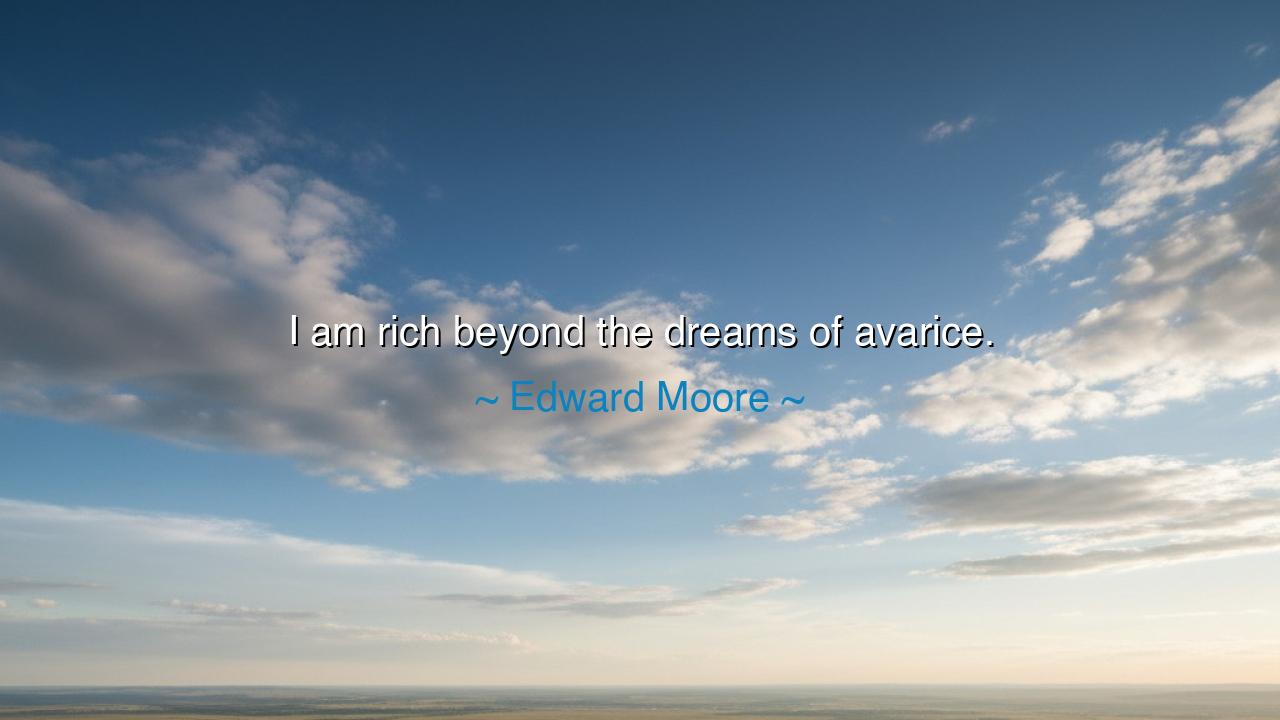
I am rich beyond the dreams of avarice.






The words “I am rich beyond the dreams of avarice,” first spoken by Edward Moore in his 18th-century play The Gamester, echo through the ages like the solemn toll of a temple bell. Though born upon the stage, this phrase transcends the confines of drama. It is not a boast of gold or jewels, but rather a cry of the soul—a declaration that true wealth lies not in coin, but in contentment. Moore’s line reminds us that a man may possess the world and yet be poor, while another, owning little, may walk as a king through the courts of his own spirit.
In the play, these words are spoken not in triumph, but in tragedy. The gambler, having ruined himself through greed, realizes too late that the riches he sought were mere shadows. His eyes, once blinded by avarice, now open to the radiant treasures he had ignored—love, peace, virtue, and the gentle warmth of companionship. Thus, the phrase becomes both a confession and a revelation: a man can be “rich” not by the abundance of his possessions, but by the depth of his gratitude.
Consider the story of Diogenes of Sinope, the ancient Greek philosopher who lived in a barrel and mocked the vanity of the powerful. When Alexander the Great, ruler of the known world, visited him and asked if there was anything he desired, Diogenes merely said, “Yes, stand out of my sunlight.” In that moment, Alexander—the mightiest of kings—stood before a man richer than himself. Diogenes, having nothing, lacked nothing. His wealth lay in freedom, in wisdom, in the serenity of a mind unbound by craving. Such is the essence of being “rich beyond the dreams of avarice.”
This wisdom pierces the illusions of our age as surely as it did in Moore’s time. Many chase wealth as if it were salvation, yet the pursuit of avarice is a mirage leading only to thirst. The merchant who counts his coins by candlelight, the magnate who builds his towers of glass and steel—all are but wanderers in the desert if their hearts are hollow. But the one who rises each morning grateful for breath, for bread, for love—that one stands upon the summit of abundance.
To live by this truth is not to despise material things, but to know their proper place. Gold may purchase comfort, but not peace; it may open doors, but not hearts. True wealth is the harmony between desire and duty, between what one owns and what one cherishes. When the mind ceases its restless hunger, the spirit becomes fertile ground for joy. Then, and only then, can one declare with honest pride, “I am rich beyond the dreams of avarice.”
Let this teaching be your compass: seek not to possess, but to appreciate. Gather not treasures that rust, but virtues that endure. Give freely, love deeply, rest contentedly. Let gratitude be your coin, kindness your crown, wisdom your inheritance. For in the quiet of such a heart, all the riches of heaven and earth are gathered silently, unshaken by time or tide.
And so, traveler on the path of life, remember this: your riches are already within you. The smile of a friend, the strength of your body, the peace of a clear conscience—these are jewels beyond appraisal. Guard them well. When next you gaze upon the wealth of others, whisper these words with quiet triumph and humility: “I am rich beyond the dreams of avarice.”






AAdministratorAdministrator
Welcome, honored guests. Please leave a comment, we will respond soon